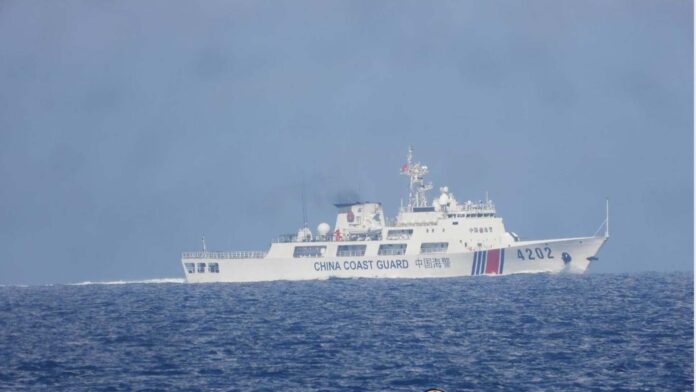The Philippines will not be used as a “staging post” for any military action amid tensions in the Indo-Pacific region, President Ferdinand R. Marcos Jr. said Sunday.
Marcos gave the assurance in an interview with the press en route to Washington, D.C. for an official visit, as he maintained that the Philippines continuously “works for peace”.
“Simple lang ang goal natin sa Pilipinas (The Philippines’ goal is simple), we work for peace… We’ll not encourage any provocative action by any country that involves, that will involve the… provocative action that will involve the Philippines by any other country. We will not allow that to happen,” Marcos said.
One of his agenda for the US visit is to tackle the “evolving” Mutual Defense Treaty (MDT) between the Philippines and its longstanding ally, the United States.
The best move for the Philippines, he said, is to stay within the Association of Southeast Asian Nations (ASEAN) as the bloc plays a crucial role in “keeping peace” and “lowering tensions in our area”.
“Keep ASEAN solid, strong, and united. So that, if that’s the case, if we are…at least, we have a consensus and areas of agreement then it will remain strong and that will be… that ASEAN will still be the one to conduct and to lead the political fortunes of all the other countries around Asia,” he said.
Direct communication between Manila, Beijing
Marcos, meanwhile, called for the final adoption of a Philippines-China “direct communication line” after Chinese and Philippine ships came close to a collision in the West Philippine Sea.
“This is the kind of thing that… we’re hoping to avoid, that this time it was a little more dangerous because malapit na sila eh (they’re so close),” said the President. “Talagang kamuntik na nagbanggaan (They almost collided) and that will cause a great many… that can cause casualties on both sides.”
Two Chinese Coast Guard vessels “intercepted” Philippine Coast Guard vessels in the vicinity of Ayungin Shoal, exhibiting “aggressive tactics” towards BRP Malapascua and Malabrigo, respectively on April 23.
The Chinese vessel carried out “dangerous maneuvers” coming within 50 yards of Malapascua, which a team from Agence France-Presse aboard the Filipino boat said resulted in a “near-collision.”
Similar maneuvers were documented on April 19, involving CCG 5201 and 4202, and the BRP Malapascua while the latter was en route to Ayungin Shoal, according to the Department of Foreign Affairs.
Marcos stressed the need to establish a “high-level” communication mechanism with Beijing to reduce misunderstandings.
“Hindi pa natin nabubuo (It’s still not formed yet). we’re waiting for China to give us the details kung who will we be the team at their end,” he said.
The Philippines has created a team and has “submitted the names, even the telephone numbers of these people”, according to Marcos.
Both Marcos and Chinese President Xi Jinping earlier affirmed the establishment of a “direct communication mechanism” during the Filipino leader’s official state visit to Beijing in January.
While the overall priority is safeguarding maritime security, Marcos said China has agreed to “sit down” and talk about Filipinos’ fishing rights in the West Philippine Sea.
Marcos has directed the Coast Guard and the Department of Foreign Affairs to put together a map of these fishing grounds and present it during the discussion.
“Sasabihin natin, ito Pilipinas talaga ito (We’ll say that this is the Philippines) and we’ll see what they say when we give them our proposal,” Marcos said. (PNA)
Photo credit: Facebook/coastguardph


